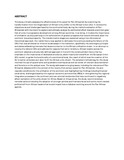| dc.description.abstract | This study critically assesses the effectiveness of the quest for Pan-Africanism by examining the
transformation from the Organization of African Unity (OAU) to the African Union (AU). It
reviews the objectives as well challenges faced by the continental body during the
institutionalization of Pan-Africanism with the intent to explore and critically analyze its
continental effort towards a common goal; that of unity in progressive development among
African countries. In so doing, it invokes the importance of unification as a key pathway to the
achievement of greater prospects that would ultimately steer the continent towards prosperity.
The transformative stages are explained using a two dimensional theoretical approach; the realist
theory was applied to delineate the events preceding the failure of the OAU that was attributed to
inherent weaknesses in the institution, specifically the sovereignty principle and states selfseeking
interests that became a barrier to the African unification dream. In an attempt to revamp
the defunct OAU and address the reasons that led to its failure, African leaders across the
continent adopted a structurally defined approach in line with the constructivism theory that lay
emphasis on the importance of dedicated structures, albeit heavily borrowed from the European
Union (EU) model, to guide the functionality of a continental body, the result of which was the
creation of the AU to better articulate and steer forth the African unity dream. The selected
methodology for the study involved the use of quantitative and qualitative techniques as well as
review of relevant documentation and literature on the subject area. The study addressed
emerging issues, including the relevance of Pan-Africanist debates within the context of the
twenty-first century quest for Pan-Africanism, the pre-requisite conditions for the unification of
the continent and highlighted key findings including financial constraints, challenges faced by
the regional economic communities (RECs) in strengthening the regional integration processes in
the continent and neo-colonial tendencies that have continued to negatively affect realization of
the unity dream for Africa. Based on this premise, the study recommends key remedial actions
including the adoption of stronger policies and frameworks as well as the much needed political
will from African leaders that would impact future debates revolving around the Pan-African
agenda. | en |


